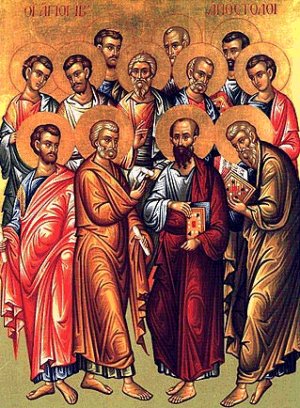
Jesus did not choose a woman among the apostles
|
 |
|---|
"He went up into the hills and called to him those he had chosen. They came to him. He appointed twelve to be with him and to be sent out to preach and have authority to cast out demons:
Simon whom he surnamed Peter; James the son of Zebedee and his brother John whom he surnamed Boanerges, that is sons of thunder; Andrew, Philip and Bartholomew; and Matthew and Thomas, and James, the son of Alphaeus, and Thaddaeus; Simon the Cananaean and Judas Iscariot who betrayed him.”
Mark 3,13-19
According to conservative authorities in
the Catholic Church this original call is normative for the future ministry of
bishops, priests and deacons. Since no women were present among the original
twelve, women have been excluded from these ministries by Jesus himself, they
claim.
|
This document is part
of an online course. If you want to study the rules of understanding Sacred
Scripture methodically, join our course Interpreting Scripture Correctly. The course is free and offers distinct advantages. |
|---|
There are simple reasons to explain why Jesus did not include women among the original group of twelve apostles.
Conclusion: The absence of a woman among the apostolic twelve does not need to have any lasting significance.
The call of the twelve apostles is not normative for all times in all its details. Many important elements of the original call have been abandoned in the course of time.
Five of these original features will be highlighted here.
|
Mark |
Matthew |
Luke |
|
|
1. There were twelve of them. This was crucial. The 12 apostles signalled a new beginning for the 12 tribes of Israel. They respresented the New Israel prophesied by the prophets. After Jesus' death, the apostles take pains to appoint a successor to Judas to fill up the number (Acts 1,15-26). But soon after that, as new leaders were needed in many early church communities, the number twelve was abandoned. |
3,14 | 10,1 | 6,13b |
|
2. Their call was based on a personal selection by Jesus. Again, after Jesus' death, Peter tries to make up for this when choosing a successor to Judas. After selecting two candidates, the final decision is reached by casting lots, implying that the final decision was ultimately God's. Paul's ordination as an apostle took place after an intervention by local prophets in Antioch (Acts 13,1-3). However, quite soon the selection of new candidates was made by leaders and members of the communities themselves (Acts 14,23). |
3,13 |
10,1 | 6,13b |
|
3. The apostles received power to drive out unclean spirits and cure the sick. This new authority of the apostles was a distinguishing mark of their ministry. They were specifically sent out to drive out demons and cure sick people so that their preaching would be more easily believed. Although the Acts of the Apostle still mentions such miracles being performed by Peter and Paul, the driving out of demons and curing of the sick are not maintained as part of the later ministries. |
3,16; 6,7 |
10,1 |
9,1 |
|
4. All the twelve apostles belonged to the Jewish race. This is clear from their names and the origins indicated for some of them. Their being Jewish was also important since they were the 12 new 'patriarchs' of Israel. Jesus' first injuction to the twelve was: "Go nowhere among the Gentiles and enter no town of the Samaritans. Rather go to the lost sheep of the house of Israel". However, being Jewish was dropped as a requirement for the ministry. |
3,16-19 |
10,2
10,5-6 |
16,14-16
|
|
5. The apostles were free men. The twelve were fishermen and craftsmen, but they were free. Jesus did not include a slave among them, or even someone who had been a slave. In the later Church also former slaves were admitted to the ordained ministries. |
Conclusion: Five important features of the
call of the twelve apostles were later dropped in Church practice. Why should
the fact that all the twelve were male constitute a permanent
norm?
The absence of a woman among the original twelve is a purely negative fact. Negative facts prove nothing as other Gospel texts illustrate.
 |
|---|
|
Sandals as worn in the time of the apostles |
1. Mode of travel
Jesus ordered his apostles to travel as the poor did. No worse, as the poorest of the poor did: barefoot.
"Take no gold, nor silver, nor copper coins in your belt, no bag for your journey, nor two tunics, nor sandals, nor a staff!" Matthew 10,9-10; see Luke 10,4
These injuctions were taken seriously. Mark mentions that Jesus relaxed them regarding sandals and a walking stick:
" . . . nothing for your journey except a staff; no bag, no food, no money in your belts; you may wear sandals but not two tunics." Mark 6,8-9
Jesus rode on a donkey at times, but did not ride on horseback (Matthew 21,1-7). He would cross the lake of Galilee in a small fisherboat.
Jesus does NOT, repeat NOT, mention the modern modes of travel like cars, buses and airplanes. He does NOT mention suitcases, wallets and travellers' cheques. How can bishops and priests today presume to use such modern modes and tools of travel?!!
2. The 'blessed sacrament' in a tabernacle
At the last supper, while instituting the eucharistic meal, Jesus clearly stated:
"Take and eat, all of you!" Matthew 26,26 (Mark 14,22; Luke 22,19)
"Drink of this, all of you!" Matthew 26,27 (Mark 14,23; Luke 22,20)Jesus did NOT, repeat NOT, say that the eucharistic bread and wine could be preserved to take communion to the sick; and certainly not that it could be kept in a tabernacle for worship. How could the Church presume to adopt such practices?!!
3. The language used in the liturgy.
Jesus spoke his mother tongue: Aramaic. For instance, he taught us the prayer we call the 'Our Father', saying very clearly: "Pray like this!" Matthew 6,9; Luke 11,2
To hear what the original prayer sounds like, click on the video below:
When Jesus said: "you shall pray like this", he did NOT, repeat NOT, indicate that translations would be permitted. How could generations of Christians until this day have presumed to say the Our Father in their own languages?
Conclusion: Examples like this could be multiplied.
If the negative norm of Jesus NOT having said or done something explicitly is taken to imply a permanent decision, many legitimate later decisions by the Church are totally invalid.
In the same way, stating that the absence of women from the original twelve constitutes a permanent norm makes no sense.
The original call of the twelve was not normative in the sense that it laid down all the requirements and features of the ministries instituted by Jesus:
For all these reasons we can be absolutely sure that the absence of women from the apostolic twelve did not constitute a permanent norm by which women are excluded from ordination.
Professor Reimund Bieringer presents the full scriptural argument here.
© John Wijngaards

The texts in our course Interpreting Scripture Correctly were written by John Wijngaards in 2009. Part of the contents is based on his earlier publications, in particular:
Illustrations in the video clip by Jackie Clackson.